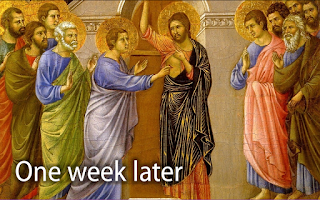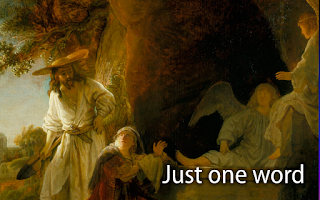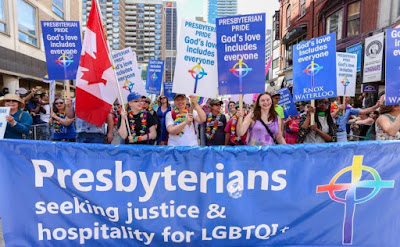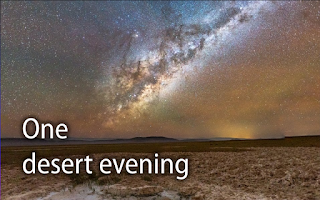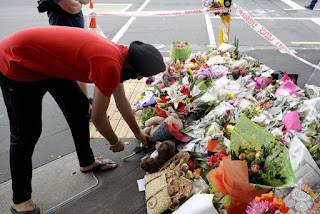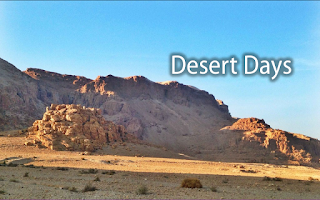Hespeler, 28 April 2019 © Scott McAndless
Acts 5:27-32, Psalm 150:1-6, Revelation 1:4-8, John 20:19-31
| I |
t had been one week, seven days, 168 hours. It had been one week since everything had changed, since the stone had been rolled away and the power of death had been broken forever. It had been a week since he himself had appeared among them despite the fact that the doors were locked and they cowered in fear of everyone in the outside world. What is more, it had been a week since he had given them, as a free no-strings attached gift, many great things. He had given them his peace – in fact, that had been so important that he had said it twice. He had given them the evidence, imprinted upon his very hands and on his side, of what he had been willing to suffer for them. He had given them his commission, sending them out in his name. He’d given them the gift of the Holy Spirit and, wonder of wonders, he had given them the power to forgive anybody. “If you forgive the sins of any, they are forgiven them; if you retain the sins of any, they are retained.”
Can you imagine what kind of power that represents? All of the people in the world today who are crushed by feelings of guilt, all of those who are so overwhelmed by the shame that has been piled upon them all their lives long, he had given the disciples the ability to proclaim pure forgiveness and liberty. Mind you, it was not just that they were able to proclaim that God could forgive such things. He had told them that the grace of God is so abundant in this moment that they only have to say it and it will be so.
And now it is one week later – seven days, 168 hours, and I just have one question: what have they done? What have they done with the knowledge that death has been defeated? What have they done with that peace that passes all understanding? In what ways have they exercised that awesome power to forgive? What have they already accomplished of what they have explicitly been sent to do?
I mean, I understand that there is a limit to what you can do in seven days. I don’t think that anyone would have expected them, in that time, to preach the gospel to the ends of the earth! Nor do I expect that they would have advanced so far as to proclaim the forgiveness of God to Potius Pilate or Judas Iscariot. I mean you might encounter some psychological barriers to doing that! No, I’m not saying that they should have finished in a week, but think of the start you could make in that time. You could tell hundreds the good news. You could proclaim relief to many of the broken hearted. You could bring peace to many a troubled heart. So, I don’t think that it’s unreasonable to expect that there should have been something that happened in that week.
Jesus had already done everything. He had defeated death and its power, he had vanquished sin in just three days. I don’t think it’s unreasonable to ask what they have done with the knowledge of that in seven.
So, what can we observe in the scene seven days later? What has changed? Well, apparently not very much. We find the disciples exactly where we left them a week ago. They are in the same upper room. And the door is still locked which is surely an indication that they still cower in the same fear. And how many people have they told of what they learned a week ago? Have they told tens or hundreds or thousands? Well, it would appear that they’ve only told one. They have told Thomas.
Everybody always gets down on Thomas. “Doubting Thomas” we call him. He has become the punchline of many a joke and comic strip. That’s all anybody knows about him and we assume that he must have doubted everything all the time. Of course, that’s not true. There’s only this one story of the one time he doubted something and, sure, it was a pretty important thing, but still it was just that one time.
He is not mentioned a lot otherwise in the gospels, but, where he is, he actually comes off pretty well. He was the one, for example, who, when Jesus was ready to go off to Judea to help a sick friend at a very dangerous time, responded by saying, “Let us also go, that we may die with him.”He was obviously very brave and very committed to Jesus.
So I actually think that our tradition has been a bit unfair to poor old Thomas. Yes, he had done absolutely nothing for a whole week after the resurrection of Jesus because he was waiting for some evidence. He wanted to see with his eyes and feel with his hands. But the other guys? They had seen and felt the evidence for themselves. Jesus had shown them his hands and invited them to feel his side.
And what have they done with that? It says that they believed, but their belief has not led to action. They believed, but they don’t seem to have had enough conviction in their belief to have won over the one person that they had got around to telling about it. Is this story really the story of Doubting Thomas? Or is it the story of the disciples whose belief in Jesus really didn’t make all that much difference?
It has been one week, seven days, 168 hours since he rose. It has been one week since we stood together and proclaimed the incredible truth: “Jesus Christ is risen. He is risen indeed.” It is a week since we declared our faith that Jesus has conquered the power of death and sin and that, because he lives, we shall live also.
I’m just wondering, is it fair to ask what we have done with that knowledge in the past week? Mind you, I am not asking what you have done with it since you first heard about it or since you first came to faith in Jesus. I’m assuming, I’m hoping that we all assume, that the fact that we believe that Jesus Christ rose from the dead makes a difference in the overall picture of our lives, but to ask what difference it made this past week is a little different. To ask what difference it will make next week is also a little different.
The risen Christ has come to you with the words, “Peace be with you.” But have you received that peace? Have you become a person of peace? Does the fact that Jesus has vanquished the power of sin and hatred not mean that you don’t need to be aggressive towards anyone who disagrees with you, or defensive towards anyone who threatens you? Does fact that he won not by fighting back but rather by obedience and faith in God not mean that you can be a person of peace in all of your interactions?
And Jesus’ resurrection has unleashed the power of God’s forgiveness – a power that Jesus has given to you as his follower. How have you exercised that power this week? Do you realize that anyone who says that something is unforgivable or that God cannot forgive certain things is denying the power of Jesus’ resurrection? God’s answer to the world’s misery is now grace and forgiveness because of Jesus. There is really only one thing that keeps forgiveness from being the way of the world today and that is our failure to practice it. As we cling to our resentments or our hatreds, we keep the power of the resurrection from reigning in this world. So, it is the right question to ask you, if you are follower of Christ, who you have forgiven this week. I know that there are things you have to overcome – that there are exercises of grace that you have to build towards over time – but have you started? I think that Jesus would ask no less in one week after Easter.
Most important of all, it has been one week since you were given the gift of the Holy Spirit and sent out. “As the Father has sent me, so I send you,” he has said. And do you recognize what it means to be given such a status – to be sent out into the world to represent God’s anointed one whom he sent into the world? It means that when you go out into any situation, you are not representing yourself as you bring words of peace or forgiveness or reconciliation. You are speaking for the great king over all the earth and he has given you authority to do so.
Can you imagine a Canadian ambassador, sent to represent the interests of the Canadian people, failing to speak up if the country to which she was sent was descending into chaos and she had the words, given to her by the government, that could help that country find peace and prosperity for all with Canada’s help? Of course not. To fail to do so would be a dereliction of duty. Yes, you have to be careful and respectful when you speak – you need to appreciate where other people are coming from. Every diplomat knows that, but when you are sent, you have to remember who you represent.
So, in the last week, how have you behaved as one who was sent by Christ into the world? Have you done that or have you fallen into the trap that we all admittedly fall into from time to time – the trap of thinking that you represent only yourself in this world? Are you looking out only for your own interests and your own short-term gain? When that is the case (and, yes, it is the case for all of us at least sometimes) you are not living out the truth that Jesus is risen. In the aftermath of the resurrection, he gave you the spirit and sent you in his name.
I don’t think it will be a surprise to any of you if I tell you that doubt seems to be on the rise in the world today. There are many today – more than was once the case – who openly doubt things like the existence of God or the resurrection of Jesus. But, just like I am not inclined to blame Thomas for his doubts, I am not willing to blame the modern doubters for failing to see these things as we see them. I know that they will say that the issue both for them and for Thomas is the question of evidence: “Unless I see the mark of the nails in his hands, and put my finger in the mark of the nails and my hand in his side, I will not believe.” And I’m fine with that. I get that the lack of concrete evidence can be a problem. If it was just a matter of forensic evidence – if that were all we had to go on – I’m not sure that it would be enough for me either.
The thing that will ultimately convince you and me and all the doubters in the world that is true is not that. It did not convince Thomas either by the way. When he was invited to put his finger in Christ’s hands and reach out his hand and put it in his side, his need to do so disappeared and he instead fell to his knees in worship. The proof, for all of us, comes in living it. That is why it matters what you did with your knowledge of the resurrection over the past week. That is why it matters what I did with it. And if we all dared to practice that peace, to practice that kind of forgiveness, to dare to take that authority and spiritual power that the risen Jesus gives us, I do not think that rising doubt in the world would be the problem one week after Easter.
